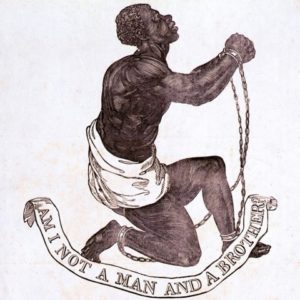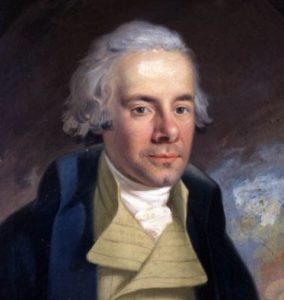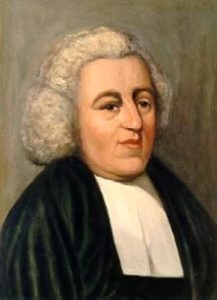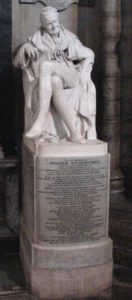
Josiah Wedgwood, et al. / Public domain.
ORLANDO, FL (ANS) Few examples of systemic racism are more glaring than the African slave trade. British parliamentarian William Wilberforce led a grueling twenty-year struggle to outlaw it. Inspired by a former slave trader, he became a model that current anti-racism activists could do well to emulate.
Abraham Lincoln acknowledged Wilberforce’s significant role in abolition. South African president Nelson Mandela, addressing the British Parliament in 1996, declared, “We have returned to the land of William Wilberforce who dared to…demand that the slaves in our country should be freed.”
Legal, lucrative, brutal
Eighteenth-century Britain led the world in slave trading. A pillar of colonial economy, the trade was legal, lucrative, and brutal. In one notorious episode, a ship’s captain threw 132 slaves overboard because of illness and water shortage. British law protected the ship’s owners, considering slaves property (like “horses,” ruled one judge).
Enter Wilberforce, young, eloquent, popular, and ambitious. He seemed destined for political greatness. Then, a profound change led him on a path that some say cost him the prime ministership, but made an indelible historical mark for justice.

Image: Anton Hickel / Public domain.
Pivotal decisions
While traveling with Cambridge professor Isaac Milner, a skeptical Wilberforce spent long hours discussing biblical faith. His doubts receded as Milner answered his objections. Initial intellectual assent to Christian faith morphed into deeper conviction and a personal relationship with God.
Considering leaving Parliament for the ministry, he consulted John Newton, slave-trader-turned-pastor and writer of the well-known hymn, “Amazing Grace.” Newton counseled Wilberforce to remain in Parliament, that God had raised him up “for the good of the nation.”
Fierce opposition
In time, Wilberforce grew to consider “the suppression of the slave trade” part of his God-given destiny. Opposition was fierce. Financial stakeholders howled. Some claimed slavery benefited slaves since it removed them from barbarous Africa. The Royal Family opposed abolition. Even Admiral Lord Nelson, Britain’s great hero, denounced “the damnable doctrine of Wilberforce and his hypocritical allies.”

Contemporary portrait / Public domain.
Wilberforce and the Abolitionists repeatedly introduced legislation. Apathy, hostility and parliamentary chicanery dragged out the battle. Twice West Indian sea captains threatened Wilberforce’s life. His health faltered.
Buoyed by friends and his faith, Wilberforce persisted. He believed God viewed all humans as equal, citing the biblical Acts: “[God] has made from one blood every nation….” Methodism founder John Wesley encouraged perseverance, writing, “[I]f God be for you, who can be against you? …be not weary of well-doing! Go on…till even American slavery (the vilest that ever saw the sun) shall vanish away….”
Bipartisan civility
Wilberforce sought bipartisan support, setting aside differences on certain issues to collaborate for the greater good. He rallied political liberals and conservatives, Quakers and Utilitarians. He tried to make civil discourse civil, aiming to disagree without being disagreeable.
Persevering for twenty years, in 1807 Wilberforce prevailed. Parliament erupted in cheering as the slave-trade-abolition law passed.

Samuel Joseph / Public domain.
Enduring legacy
Outlawing the slave trade proved the impetus for a host of social improvements, including prison reforms, child labor laws, and abolition of slavery itself in 1833, of which Wilberforce learned a few days before his death.
His Westminster Abbey memorial inscription commends his efforts, “Which, by the blessing of God, removed from England the guilt of the African slave trade, and prepared the way for the abolition of slavery in every colony of the Empire: …he relied, not in vain, on God….”
William Wilberforce was not perfect. He had fears, flaws and foibles like anyone. You likely would not agree with all his political views. But he did possess dedication to principle and to God, close friends of many stripes, a penchant for bipartisan cooperation, and steadfast commitment to right terrible injustice.
History generally has treated him kindly. Could bipartisanship, civility, and faith play significant roles in today’s racial struggles?
Copyright © 2020 Rusty Wright
# # #
Editors: For access to these images and more, check here, here, here, here, and here.
** You may republish this or any of our ANS stories with attribution to the ASSIST News Service (www.assistnews.net). Please also tell your friends and colleagues that they can get a complimentary subscription to ANS by going to the website and signing up there.






